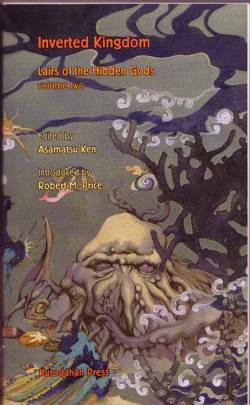Inverted Kingdom
edited by Asamatsu Ken
Originally for the Candlemass, 2006 mailing of the Esoteric Order of Dagon (#133)

The anthology's opening tale, "The Horror in the Kabuki Theater" by Ashibe Taku, is the longest story in the book, certainly of at least novella length. The story is a rich depiction of 19th century Japanese theater, with many references to what could be actual people that I don't know. Although initially confusing to someone who is not familiar with kabuki, but the well-drawn details are enough to keep the reader going as the story builds some very powerful momentum. This is an excellent, strong beginning to the anthology, reminding us that this is a new world that we are entering is not the familiar world of stories written for English-speaking audiences.
"Taste of Snake's Honey", by Matsudono Rio, cannot help but suffer by comparison. The narrator is a thoroughly debauched Westerner who has come to Japan in pursuit of business, and his father's former partner. While competently written and translated, this story doesn't seem to break much new ground as far as Mythos fiction goes.
"Inverted Kingdom" was written by Matsuo Mirai, who wrote both the screenplay and the novelization of Insumasu no Wo Kage, an adaption of "Shadow over Innsmouth" set in Japan, which spawned the Virtual Boy game Insmouse no Yakata or Innsmouth Mansion. With this for background, it wasn't difficult to assume that he had written a tale of Deep Ones. This is the story of a lost soul named Mizuki, who is drawn to Lake Saiko after a landslide devastates three villages there.
Konaka Chiaki's "Terror Rate" successfully incorporates a few Lovecraftian trappings into the very successful Japanese horror trope of the hungry ghosts, as recently popularized by the films The Ring and The Grudge. And although the story really owes more to these ghosts, touching only lightly on Lovecraft, it is the most viscerally spooky and unsettling story in the anthology.
Where most of the stories in this anthology really take their time in getting developed, Takana Fumio's "Secrets of the Abyss" seems rushed by comparison. The plot deals with a man whose wife is dying of cancer, and who seems to discover a cure for it. Of course there are complications, but there are certain leaps of intuition that the protagonist makes that do not feel warranted. This does not make the story bad or unreadable, but rather notably jarring in its transitions. I suspect that these would not be noticeable if the story were placed among English Mythos stories, but when set amid the more stately paced stories that make up this collection, it can be a bit jarring.
"A Night at Yuan-Su" by Nanjo Takenori is unusual in that it does not borrow from Lovecraft's more commonly-imitated mythos tales, but rather from his earlier, Dunsanian works. True to these stories, "A Night at Yuan-Su" creates a dream-like atmosphere, and exhibits a longing for the past that, while not uniquely Lovecraftian, is certainly a recognizable theme from his work.
"Summoned by the Shadows" by Hirayama Yumeaki is another story that deals with ‘hungry ghost' tropes. A man with a family is downsized, and move into a small house that has a small grave in the yard. Naturally, it all goes horribly awry. Despite the predictable path of the story, the journey is well worth the ride. When the strange and supernatural events begin to occur, they are not what I was expecting, given the set-up of the story.
The alienation of Japanese culture is very much on display here. In several of these stories, the narrator turns out to be 'special' to one of various Great Old Ones, if not an outright Wilbur Whateley human-other crossbreed. While this is standard Mythos fodder, the revelation of a mixed heritage is not particularly shocking, and in my opinion needs to be supported with something else.
Again, for those of you who like "mythos" fiction, Inverted Kingdom is an interesting book to pick up, simply to witness an approach to Lovecraft from a very different culture. And if some of the stories don't tickle my fancy, I can at least say that I'm surprised by the number of stories that do, since the story-telling tradition involved is not technically from my culture. So while Inverted Kingdom may not satisfy all tastes, it will give readers a glimpse of the influence the New England Recluse has had on cultures he never dreamed he would be addressing.